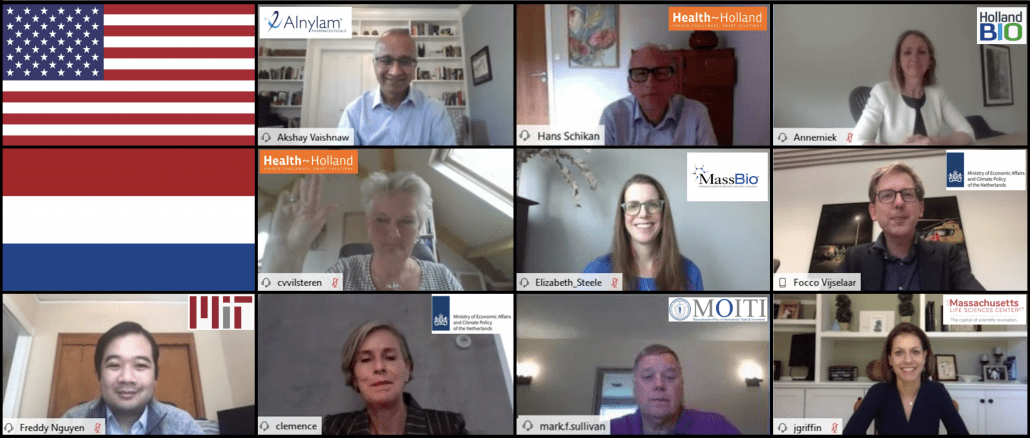Key stakeholders Massachusetts and the Netherlands meet again in virtual session

Two weeks ago, key stakeholders from Massachusetts and the Netherlands came together in a digital session to discuss how the Life Sciences & Health ecosystems are responding to COVID-19, which lessons could be learned from the reaction to the pandemic, and how to stimulate closer international collaboration.
The same organisations also signed a MoU in 2019 to advance ongoing collaboration in life sciences and included Mark Sullivan (Massachusetts Office of International Trade and Investment, MOITI), Elizabeth Steele (MassBio), and Jennifer Griffin (Massachusetts Life Sciences Center) from Massachusetts and Focco Vijselaar (Ministry of Economic Affairs and Climate Policy), Clémence Ross-van Dorp (Ministry of Economic Affairs and Climate Policy), Annemiek Verkamman (HollandBIO) and Carmen van Vilsteren (Health~Holland) from the Netherlands. Akshay Vaishnaw (Alnylam Pharmaceuticals) and Freddy Nguyen (MIT COVID-19 Challenge) were invited as speakers to share their activities in light of COVID-19. The session was moderated by Hans Schikan (Top Sector Life Sciences & Health).
Biotech companies have proven to be dynamic and are pivoting to focus their work on therapies and vaccines. Even more so, participants observe an increased level of cooperation between different companies, researchers and governments to find solutions. For instance, the extent with which data has been shared across the sector has largely increased. This doesn’t stop at the private sector, as public and semi-public organizations have informed each other across borders to support each other in handling the situation. Also when looking at formal procedures, agencies have shown great efficiency in shortening approval procedures to speed up the development of vaccines and therapies.
A paradox can be observed regarding the supply of PPE and other vital medical equipment that companies have sourced internationally. The pandemic has shown the limits of international supply chains, therefore, will governments require that vital manufacturing be maintained within their geographical reach? On the other hand, participants in this virtual session agree that there will always be a need to collaborate internationally and make use of each other’s strengths. According to the Airbus model, if all strengths from different countries or ecosystems could be brought together, this will create a stronger value chain where collaboration between partners is needed and truly adds value.
When looking ahead, participants recognize that in a post-COVID world, we should be better prepared for a possible outbreak of a pandemic. That we need to be ready to think and act together, internationally, so we can organize the supply chain and share data and expertise when needed.

